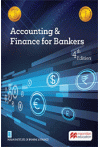
- Author(s): IIBF
- Publisher: Macmillan India Ltd
- Edition: 4 Ed 2021
- ISBN 10 9387687228
- ISBN 13 9789387687226
- Approx. Pages 568 + Contents
- Format Paperback
- Approx. Product Size 24 x 18 cms
- Delivery Time 3-5 working days (within Kerala & South India) (Others 7-9 days)
- Shipping Charge Extra (see Shopping Cart)
............................................................................................................................
Description
This book is a practical handbook that takes the reader through accounting and financial techo sin an easy to follow, progressive way. The concepts involved in the subject are explained in a lucid tiner to enable students from a non-commerce background to understand the intricacies involved subject. Throughout the book, examples are given to test the readers' understanding of the cual accounts-profit and loss accounts, balance sheets, accounting ratios, cash flow, financial reporting standards besides banking operations. Established in 1928 as a Company under Section 25 of the Indian Companies Act, 1913, Indias Institute of Banking & Finance (IIBF), formerly known as The Indian Institute of Bankers (IIB), is a professional body of Banks, Financial Institutions, and their employees in India. With a total membership of over 9 lakhs, IIBF is the largest institution of its kind in the world and is working with a Mission to develop professionally qualified and competent bankers and finance professionals primarily tough a process of education, training, examination, consultancy / counselling and continuing prop Sonal development programs." During its 93 years of service, IIBF has emerged as a premier institute in banking and finance education for those employed as well as seeking employment in the sector, aiming for professional ecolence. Since inception, the Institute has educated numerous members and awarded several banking and finance qualifications, viz., JAIIB CAIB, Diploma and Certificates covering diverse and contemporary subjects in the banking & finance domains, which have helped the banking & finance professionals to sustain their professionalism through continuing professional development programs.
............................................................................................................................
Contents
Module A - Business Mathematics and Finance
1. Calculation of Interest and Annuities
2. Calculation of YTM
3. Capital Budgeting
4. Depreciation and its Accounting
5. Foreign Exchange Arithmetic
Module B – Principles of Book-Keeping & Accountancy
6. Definition, Scope, and Accounting Standards
7. Basic Accountancy Procedures
8. Maintenance of Cash/Subsidiary Books and Ledger
9. Bank Reconciliation Statement
10 Trial Balance, Rectification of Errors and Adjusting and Closing Entries
11. Capital and Revenue Expenditure
12. Bills of Exchange
Module C: Final Accounts
13. Balance Sheet Equation
14. Preparation of Final Accounts
15. Ratio Analysis
16. Final Accounts of Banking Companies
17. Company Accounts – I
18. Company Accounts – II
19. Accounting in Computerized Environment
Module D : Banking Operations
20. Banking Operations
21. Operational Aspects of KYC/Customer Service
22. Operational Aspects of Accounting Entries
23. Operational Aspects of Handling Cash/Clearing
24. Operational Aspects of Deposit Accounts
25. Operational Aspects of Loan Accounts
26. Operational Aspects of CBS Environment
27. Back Office Functions/Handling Unreconciled Entries in Banks
Sample MCQs
Bibliography
............................................................................................................................
Author Details
Indian Institute of Banking & Finance (formerly The Indian Institute of Bankers) was established in 1928. With membership of over 750 institutional members and over 2.5 lac individual members, it is the largest institute of its kind in the world and is working with a mission 'to develop professionally qualified and competent bankers and finance professionals primarily through a process of education, training, examination, consultancy/counseling and continuing professional development programs'.
The institute has almost all the banks and financial institutions - public sector, private sector, foreign, cooperative and regional rural banks - as members in addition to IT/BPO companies and individuals working in the banking and finance industry. The Institute offers a number of professional courses in banking and finance and is managed by a Governing Council consisting of Chairmen/CEOs of different banks and eminent academicians. The institute has collaborations with reputed international bodies like Canadian Institute of Bankers; Securities Institute, Australia; World Bank Institute, Washington; American Bankers' Association and The Asian Banker, Singapore and IIMs/XLRI, India, for offering courses and CPD programs to finance professionals.
............................................................................................................................
